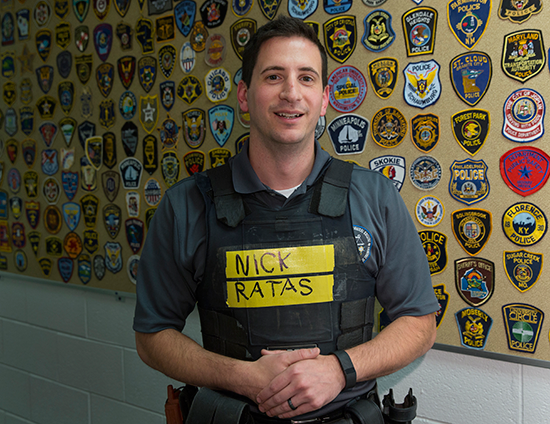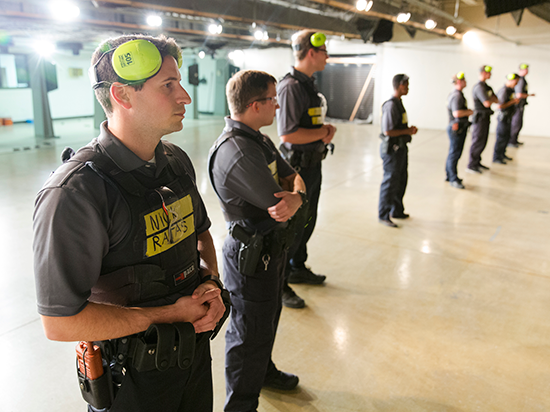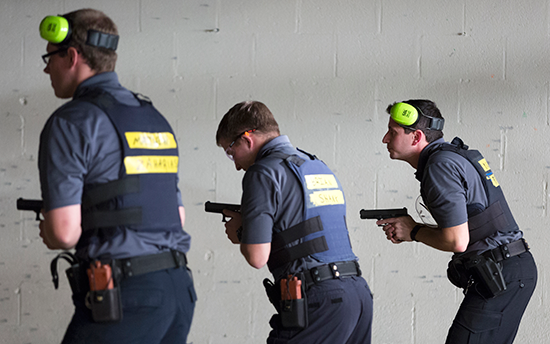
Nick Ratas
Embedded in a small village in Afghanistan in 2010, Nick Ratas was one of a group of Marines who helped bring medical services and school supplies to Afghan women and children. As a member of a military police (MP) platoon, Ratas and his fellow Marines protected Navy medical corpsmen and villagers. He said that the experience of “serving and protecting” was influential in his decision to eventually enroll in MATC’s criminal justice studies associate degree program and later, MATC’s Law Enforcement Recruit Academy.
Raised by a single mother, Ratas said he lacked a strong male role model as a youth. “I was not the most serious student, and sometimes skipped school.” He said a school resource officer (SRO) from the local police department stepped in and tried to help “redirect” him. He looked up to that officer and appreciated his guidance. That experience also influenced his future career goals.
Ratas enrolled for a six-year stint in the Marine Corps Reserve after graduating from Menomonee Falls High School in 2005. “I wanted to feel a part of something more than myself,” he said. “I liked the element of teamwork. I knew that people hired veterans and that the GI Bill would help me with college expenses. It was also a way to gain independence.”
While in the reserves, he attended boot camp and Rifleman School, took courses at the University of Wisconsin-Milwaukee and held a variety of jobs. His initial military assignment was handling bulk fuel for the Marines, which included “working with anything that takes fuel – helicopter, jets, whatever," he said. "We kept track of how many gallons each vehicle needed.”
Volunteered for Deployment in Afghanistan
When the Marines asked for volunteers to be deployed to Afghanistan as part of an MP unit, Ratas stepped forward. “As a field MP, we did convoy security," he said. "We had training maneuvers, weapons training, and learned how to deal with local nationals.”
Ratas explained that Afghan women have very little access to medical care. Doctors are scarce and villagers often must travel long distances to see them. Further hindering opportunities to see a doctor, women are only allowed to travel when accompanied by a male.

After serving in the Marine Corps, Ratas (left) enrolled in MATC's criminal justice studies associate degree program and
then in MATC's Law Enforcement Recruit Academy.
The U.S. military tried to alleviate the problem by sending medical personnel to care for the villagers in their homes. Ratas’ Marine MP platoon safeguarded the Navy corpsmen who cared for the villagers. “It took about three months before the Afghan people were comfortable and accepted us,” he said. “But they came to trust us.”
Much of Ratas’ Afghanistan experience was positive because he was able to help others, but he said there were frightening elements to his service as well. “We did come across some scary situations,” he said. “The first kid I saw was 10 to 12 years old and carrying a gun. That was very impactful.”
At 24, Ratas was one of the older Marines in the group. He said that because of his age, others tended to look to him for counsel and advice. “I took on a mentoring role,” he said. “People came to me with issues and problems. I liked trying to help them.”
Parallels Between Military Service and Police Science
Both helping mentor his fellow Marines and receiving assistance from the school resource officer influenced his desire to become a police officer. “The structure of police departments is similar to the military,” Ratas said. “The skills I learned in the military will come in handy as a police officer. I want to serve my community, engage with people and be a part of something bigger than myself.”
With encouragement from his wife, he took the first step toward that goal by enrolling in MATC’s criminal justice studies associate degree program in January 2014. He chose MATC because he wanted small classes that offered individualized attention. “I wanted one-on-one education,” he said. “I wanted to know my instructors.” He became acquainted with the Jim Dailey, criminal justice studies associate degree program coordinator, who helped him with scheduling and planning so he could complete his degree in two years.
The training is very hands on. That’s the way I learn the best. All the instructors in the associate degree program and recruit academy are former police officers or firefighters. They can share their real life experiences, which helps out tremendously. The instructors are very high quality.
Ratas graduated from the associate degree program in December 2015, took a semester off, and then enrolled in MATC’s Law Enforcement Recruit Academy in August 2016. The recruit academy is intense, he said. Students take 720 hours of training in an 18-week period. To be accepted in the program, recruits must have at least 60 hours of college credits.
MATC Recruit Academy Enhances Employability
"For an MATC associate degree graduate, the 720-hour recruit academy is a refresher of what they learned in the associate degree program, plus other unified tactics training," said Rick Cole, Jr., director of MATC’s Recruit Academy. “Nick is a perfect example of a student who enrolled in the academy to broaden his horizons. When he graduates in December, the combination of the associate degree and recruit academy training will put him in a much better position to fulfill his dream of becoming a police officer.”
The Milwaukee Police Department trains officers in its own Police Academy, but students who hope to work in suburban departments often train in MATC’s Recruit Academy. In some cases, departments sponsor new hires as they participate in recruit training. In other cases, students put themselves through recruit school to better prepare themselves to land good jobs. As police department budgets shrink, applicants who have already been through the academy have an edge when it comes to hiring, said Cole.

Ratas (right) and fellow students in the Recruit Academy train for tactical situations.
Ratas is very pleased with his MATC education. “The training is very hands on,” he said. “That’s the way I learn the best. All the instructors in the associate degree program and recruit academy are former police officers or firefighters. They can share their real life experiences, which helps out tremendously. The instructors are very high quality.”
Drawn to mentoring and service to others, Ratas hopes to someday become a school resource officer himself. “If I can impact a child or a young adult in a positive way, it will make all my training worthwhile,” he said.
To learn more about MATC’s criminal justice studies associate degree program, visit: http://www.matc.edu/tas/degrees/criminal-justice-studies.cfm
For more information on MATC’s Law Enforcement Recruit Academy, see http://ecampus.matc.edu/policetraining/

